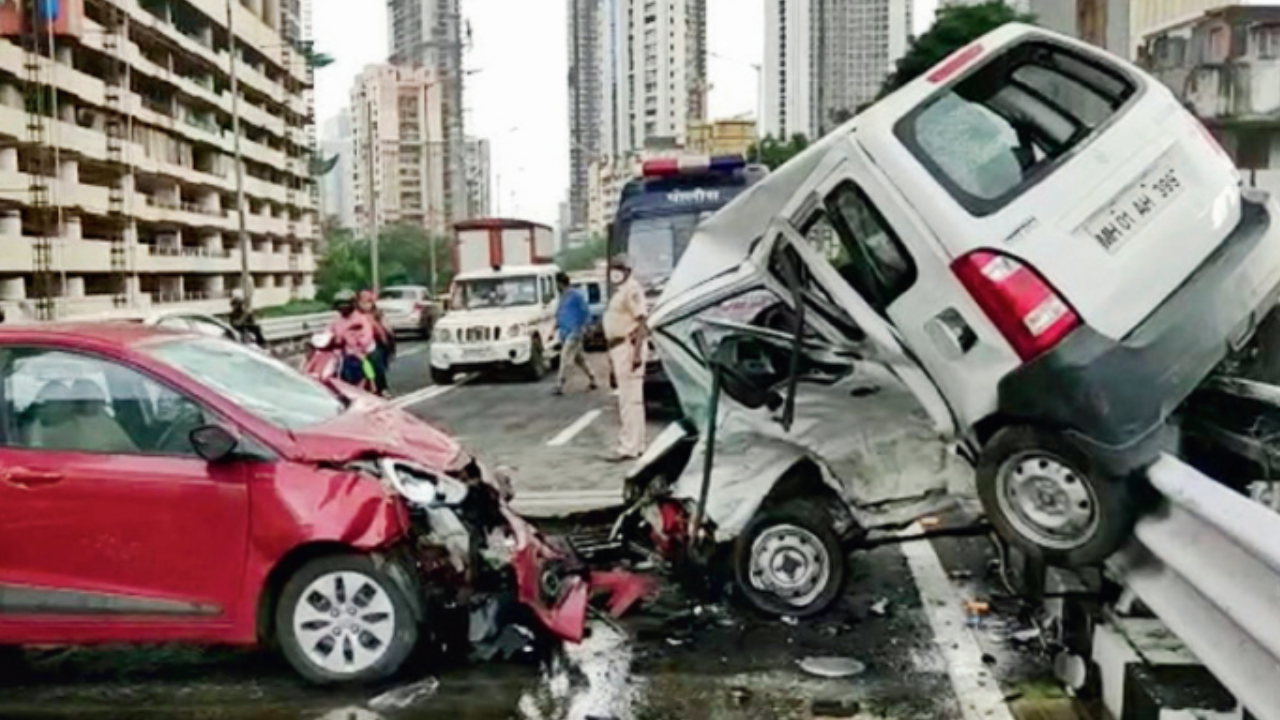[ad_1]
MUMBAI: Road crash-related fatalities in the city reduced by 35% with 176 deaths reported between January and September as compared to 272 in the same period last year.
Traffic police have attributed the drop to strict enforcement and improved infrastructure around ‘black spots’ or accident-prone locations. But with high-speed corridors like the Mumbai Coastal Road and Mumbai Trans-Harbour Link to be thrown open to vehicles in the near future, experts suggested that the authorities should start planning on how to prevent crashes on them.
“High congestion on roads during daytime and the resultant low speeds are key reasons for a reduction in fatalities. Other reasons could be mandatory use of seat belts and helmets and enhanced safety features in newer car models,” said activist AV Shenoy of Mumbai Vikas Samiti.
Annually, road traffic fatalities in the city have been on the decline since 2017, with the exception of 2021 when numbers that had dropped due to Covid pandemic-induced restrictions in 2020 witnessed a spike. In 2017, 490 fatalities were reported, which reduced to 364 in 2022. But speeding and drunk driving at late night or early morning continue to remain key factors resulting in fatalities.
In March this year, Rajalakshmi Vijay (57), an avid jogger and CEO of a tech firm, lost her life after a car, steered by a drunk man, rammed into her at Worli Seaface in the early hours. In July, a sloshed insurance agent rammed an SUV into another car along Bhulabhai Desai Road in the early hours which resulted in the death of the driver, Anshukumar Rai, and left the passenger with injuries.
“We plan to have the number of speed cameras increased on Eastern and Western Express Highways to keep a check on speeding at night. Regular crackdowns are being carried out against drunk driving and driving in the wrong direction,” said Pravin Padwal, joint commissioner of police, traffic. Senior traffic police officials added that a crash analysis team functioning out of the traffic headquarters heads to an accident site after every fatality and carries out a thorough analysis.
Experts suggest careful monitoring of newly opened or widened roads in the city. “Over the past many years, several roads have been under construction and are only recently being opened up fully. These are also roads that have always witnessed high pedestrian footfalls. They should first be made safer and also monitored,” said Dhawal Ashar, program head (Integrated Transport) with the non-profit WRI India. “Also, with many high-speed corridors to be launched soon, this is the perfect time to start planning on how to prevent crashes on them. A safe systems approach must be adopted to prevent fatalities.”
Traffic police have attributed the drop to strict enforcement and improved infrastructure around ‘black spots’ or accident-prone locations. But with high-speed corridors like the Mumbai Coastal Road and Mumbai Trans-Harbour Link to be thrown open to vehicles in the near future, experts suggested that the authorities should start planning on how to prevent crashes on them.
“High congestion on roads during daytime and the resultant low speeds are key reasons for a reduction in fatalities. Other reasons could be mandatory use of seat belts and helmets and enhanced safety features in newer car models,” said activist AV Shenoy of Mumbai Vikas Samiti.
Annually, road traffic fatalities in the city have been on the decline since 2017, with the exception of 2021 when numbers that had dropped due to Covid pandemic-induced restrictions in 2020 witnessed a spike. In 2017, 490 fatalities were reported, which reduced to 364 in 2022. But speeding and drunk driving at late night or early morning continue to remain key factors resulting in fatalities.
In March this year, Rajalakshmi Vijay (57), an avid jogger and CEO of a tech firm, lost her life after a car, steered by a drunk man, rammed into her at Worli Seaface in the early hours. In July, a sloshed insurance agent rammed an SUV into another car along Bhulabhai Desai Road in the early hours which resulted in the death of the driver, Anshukumar Rai, and left the passenger with injuries.
“We plan to have the number of speed cameras increased on Eastern and Western Express Highways to keep a check on speeding at night. Regular crackdowns are being carried out against drunk driving and driving in the wrong direction,” said Pravin Padwal, joint commissioner of police, traffic. Senior traffic police officials added that a crash analysis team functioning out of the traffic headquarters heads to an accident site after every fatality and carries out a thorough analysis.
Experts suggest careful monitoring of newly opened or widened roads in the city. “Over the past many years, several roads have been under construction and are only recently being opened up fully. These are also roads that have always witnessed high pedestrian footfalls. They should first be made safer and also monitored,” said Dhawal Ashar, program head (Integrated Transport) with the non-profit WRI India. “Also, with many high-speed corridors to be launched soon, this is the perfect time to start planning on how to prevent crashes on them. A safe systems approach must be adopted to prevent fatalities.”
[ad_2]
Source link






Join The Discussion